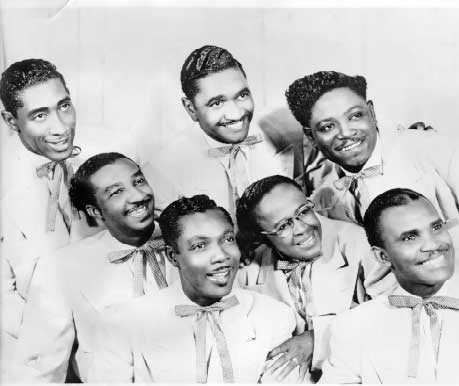By the mid-1800s, society had gotten used to the slow and solemn Negro Spirituals, but they had no idea that Quartets were about to make their grand appearance. What would be considered a group of 4 singers in Westernized music, African American quartets were heavily defined not just by 4 voices, but by up to 6 voices or instruments as well. With no background beat or instruments, all that is heard is the vocal harmony broken into 4 parts that blend magically. Quartets stayed for a long period of time, and is categorized into 3 sections: jubilee, transitional and gospel period (my favorite of the three).
1946-69 is when Jubilee Quartets went through their Gospel Period and became known as “Gospel Quartets”. They were highly influenced by gospel singers and instrumentalists after the end of the war, which resulted in an increase of Black purchasing power. Most of quartet audiences were African American Christians as well, so gospel songs and arrangements of hymns and spirituals replaced the Jubilee Quartet’s original selections of secular repertoire.


In the Gospel Period, instrumentation expanded tremendously, like additions of the organ, piano, electric bass and drums. More instruments meant a need for more added voices, which was very vocally demanding. Quartets had to have enough performers to switch out soloists, who would then be designated to lead different songs. These lead singers then began to perform extended solo passages that changed the dynamics of the entire quartet performances.
These solos incorporated falsetto, vibrato, shouting vocals and growls. They also included improvised personal testimonies, which followed the model of gospel preachers. The practice of “working sections” could also be Spirit induced and showcased the creativity and ability of the lead singer.

With the gospel period being the finale of African American quartets, it was one to remember for sure. Audiences absolutely loved the melodic harmonies of the singers, not to mention that capturing Holy Ghost-filled improvisations and performances with amazing instruments to back up. Quartets began to rise to fame with much success as they were signed to recording companies and even broadcasted on radio stations. Their consumers began to spread further than just African American audiences, but to white communities as well, which resulted in touring all over the country in churches, schools, public auditoriums, festivals, etc. The legacy and impact of quartets have changed the face of music and definitely influences the popular boy/girl bands we know and love today in mainstream culture. If it had not been for quartets growing more popular, then finding our “parts” while singing Kirk Franklin’s “Melodies from Heaven” would not exist to this day!

Login to your account